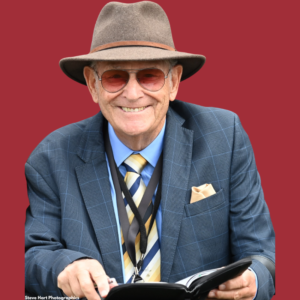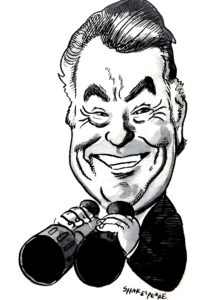Name: Mr David Hall
Date Received: 3 July 2024
SUBMISSION TO LEGISLATIVE COUNCIL
“Inquiry into the proposal to Develop Rosehill Racecourse”
My Background
I continue as a longstanding Fellow of the Institute of Chartered Accountants in Australia and New Zealand and as a Fellow of the Australian Institute of Company Directors and have served since 1980, and so continue, as a director of public and ASX listed companies.
In respect to the racing industry, I served as either Honorary Treasurer or Chairman of the Australian Jockey Club for 12 years concluding in June 2006. I had previously served on the West Tamworth Turf Club committee retiring in June 1969. I am presently a life member of the Australian Turf Club, a regular attendee at its meetings at Rosehill and Randwick and a racehorse owner.
Proposal Not Unsolicited.
As the Legislative Council’s discovery of Government records on this Proposal clearly reveals the ATC categorically stipulated to Government on October 23,2023; -“There is no plan to relocate” and “racing would continue at Rosehill even if the surrounding development went ahead.”
The Premier then met with the ATC Head of Membership & Corporate Affairs, Steve McMahon on October 30. Both gentlemen have an historic personal relationship.
Clearly political pressure was applied to induce the ATC to agree to change its expressed long held logical and prudent policy of Rosehill Racecourse not being for sale; to become a sale proposal.
Without intending to pre-empt the Legislative Council’s findings it is impossible to accept that the change in the proposal to a sale of Rosehill was other than a politically solicited proposal.
Rosehill
The retention of Rosehill as a leading Group quality racetrack is essential for maintaining the standards and quality of racing in Sydney and for the welfare of racing in NSW including employment and the revenue derived therefrom. Sydney only has two Group standard racetracks, being Rosehill and Randwick that carry the very high-profile black type racing programme that cannot be continued on only one Group quality racetrack. If Rosehill were sold the long-established and improved programme could not continue at the same standard and intensity, and would need to be reduced significantly, as neither Warwick Farm or Canterbury, are able to be upgraded to Group standard tracks due to their geographic boundaries. Such a reduction would correspondingly reduce wagering and licencing revenue from metropolitan racing and employment in Sydney.
Furthermore, Melbourne has three Group standard racetracks which would substantially benefit if Sydney were reduced to one, being Randwick, if Rosehill was to be sold.
There is no likely suitable site in Sydney to locate a Rosehill replacement in a viable metropolitan location. It should be noted that since NSW Harness Racing was relocated from Harold Park to Menangle it has declined substantially in comparison to racing and the greyhounds in both wagering turnover and attendance. Similarly Victorian harness racing declined substantially after relocating out to Melton.
Racing NSW
Governance
Racing NSW has long held and practised the view that it is a standalone bureaucracy that is not accountable to nor required to properly account to anyone. Whilst the Government appoints the board it does not otherwise appear to act contrary to Racing NSW’s sole modus operandi.
Racing NSW has acted to confirm the view that it is an independent monopoly with sole authority to act in a manner that has taken all decision-making and control from thoroughbred racing Clubs, including ownership of their assets such as racecourses all under the unsubstantiated myths of being good governance for the long-term security of the racing industry in NSW, that is not supported by current proven established management practice and governance.
In 1890 the US Government introduced the Sherman Anti-Trust Act that led to a very major divestment of the largest US monopoly in 1911. The Western World has since unilaterally adopted similar laws to prevent monopolistic conduct and in Australia the legislation is administered by the Australian Competition and Consumer Commission and the Foreign Investment Review Board.
Experts and authorities determined many years ago that monopolies are not in the long term best interests of our country’s and communities welfare. This is exacerbated when a monopoly is administered in a dictatorial manner.
Conduct
The conduct of Racing NSW was addressed as long ago as 2005 in the judgement of Racing NSW v Sydney Turf Club & Ors [2005] NSWC 426 where in Para 155 it is stated “plummeted the plaintiffs lack of professionalism to an all time low.”- Racing NSW was the Plaintiff.
Racing NSW continues to act in an intimidatory dictatorial manner; examples of which are: –
Licensed people are threatened with loss of licence or reprisal if they are not totally supportive of Racing NSW’ actions and views
Race Clubs will not be provided with development funds from Racing NSW unless they agree to Racing NSW approving board appointments providing Racing NSW with direct control and/or transferring the ownership of their racecourses to Racing NSW as recently occurred with the Scone and Goulbourn racecourses. Member owned race clubs, until the present Racing NSW Board and Executive were provided development funds by the principal authorities Racecourse Development funds solely on the basis of a loan that was not repayable unless the club became insolvent or the racecourse was sold.
Senior managers of large racing organisations have received unpleasant correspondence from Racing NSW on where they are required to start their horses
Racing NSW pays a substantial sum to Media for publication and coverage of its daily Form Guide, activities and promotions based upon which it strongly asserts and demands only positive, and often biased, editorial and comment, ensuring no criticism of its policies and performance, nor its Board and Executive.
In the Minutes of the NSW Government meeting with Racing NSW on 17 November 2023 it is stated: –
– The key elements of RNSW’s proposed legislative reform include:
o Ensure the ATC is governed by an appropriate skills based Board
to ensure the right mix of capability required.
o Reforms to ensure that the revenue derived from the ATC proposal is reinvested to benefit the racing industry as a whole.
o In the opinion of RNSW the Kembla Grange racecourse should
be an industry asset and, on that basis, transferred under freehold or long term lease to RNSW.
This again highlights the Racing NSW objective of total monopolistic control and ownership of all aspects of racing in NSW and the continuing replacement of the role, assets and undertakings of all race clubs and their members contrary to the NSW Registered Clubs Act and the long term welfare and fabric of racing in this State. To fundamentally endeavour to misappropriate, even by legislation, the assets of a member owned club is in clear contradiction of all Western democratic principles in addition to present NSW law. To claim to do so on the grounds of governance and the future and welfare of the NSW racing industry is mythical and in direct contravention of present well established good governance and management principles.
Furthermore, why is Racing NSW or the NSW Government better placed to recruit skills based Board members than the industry itself as has been practically demonstrated by the good governance of Racing Victoria. History reveals that unelected appointments to the Boards of Racing NSW and the Australian Turf Club do not consistently comply with the foregoing Racing NSW professed criteria. Racing Victoria is comprised of representatives of the broad racing industry, whereas Racing NSW is not. Recently Racing NSW is quoted in the media as saying” Most revenue the ATC gets comes from the NSW racing industry not from its members”. This statement highlights the inappropriate monopolistic attitude by failing to recognise and place in context that the lions share of the NSW racing industry revenue is derived from the wagering and licencing income, including from media/wagering rights, is derived from ATC conducted events at Rosehill, Randwick, Warwick Farm and Canterbury, the ATC being a member’s club.
Transparency
Racing NSW does not report in a manner that is consistent with current accounting standards and annual reporting.
Whilst it prepares a report for Government it does not provide any segmental, geographic or divisional information on assets, liabilities, income, expenditure or cash flow.
Knowledgeable and interested parties are unable to determine anything other than gross aggregated data e.g. nowhere in the accounts is shown, or a reader able to ascertain, the revenue retained from prizemoney for the Welfare Fund, how it is applied or invested. Similarly with the Trusts administered by Racing NSW on behalf of multiple industry beneficiaries, such as jockeys.
Good governance and transparency demand that the annual report be prepared in accordance with current accounting standards consistent with that required of public bodies and ASX listed companies.
Accountability
As previously Racing NSW conducts its affairs in a monopolistic dictatorial manner and as though it is not accountable to any party.
The Legislative Council would have ameliorated this problem to a small degree by introducing the requirements of reporting by the Auditor General of NSW and Racing NSW reporting at least six monthly to the State Budgetary Committee. Unfortunately, this opportunity was denied when the legislation was withdrawn.
The Racing Victoria model and structure addresses many of these adverse problems by being accountable to all the racing industry, not just the Government.
3 July 2024






2 Responses
Commercially viable racing.
One of the issues arising from the Rosehill-saga is the prospects for the future funding racing when betting turnover is declining and administrators are committed to the current levels of racing and prizemoney paid out.
An element in the RNSW plans is, apparently, using the proceeds of sale of Rosehill to fund administrators’ commitments. An intention that implicitly involves RNSW taking control of the proceeds of a sale that the ATC may consider would belong to it.
Not explained is whether the ‘capital’ recovered from the sale would be just run down as current outlays or a ‘capital trust’ would be established to generate funding from the earnings on its investments.
There is a need for some rethinking of the way the business of racing is being conducted.
Sobering reflections arise in the outlay, daily, of generous prizemoney on race meetings where the industry-take from the betting turnover on the meeting is unlikely to cover these outlays. If so, there are issues about the ‘commercial viability’ of the business if some race meetings are run at a substantial net-cost to the industry. This is unlikely to be sustainable into the future.
In broad terms the time may be nigh for the current business model of racing to be reviewed. Any investigation would best be conducted independently of the current mix of industry administrators and industry stakeholders and members of parliament in electorates with substantial dependent racing interests.
Peter Mair